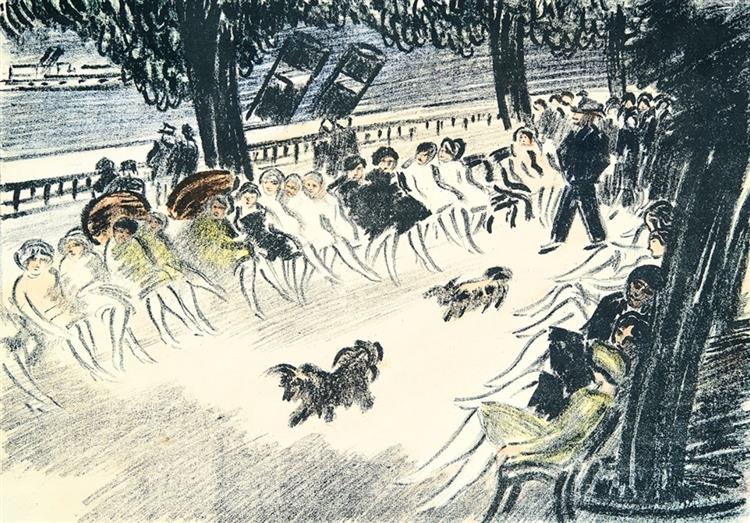Description
In the work "Duna Koró 1938", János Vasaryy invites us to tour the essence of urban life in Budapest during the interwar period. The painting captures a time in time, transporting the viewer to the riverbank of the Danube, in the prestigious walk known as Duna Koró. In this work, Vascary manages to combine the beauty of the natural environment with the sophistication of the bourgeoisie of the time, offering us a vibrant and cheerful vision of everyday life.
The composition of the painting is of remarkable complexity. The game between the horizontal and vertical lines creates a visual harmony that guides our eyes through different elements of the painting. The Danube river, which extends horizontally, serves as a central axis that divides the scenery into two parts, each with its own dynamism and charm. The human figures, mostly elegant ladies and gentlemen who walk along the boulevard, are distributed so that they provide a balance to the scene, without overloading any of the areas of the canvas.
The use of color in "Duna Koró 1938" is masterful. Vasary is inclined towards a warm and luminous palette that transmits a feeling of optimism and well -being. The pastel tones of the walkers' outfit are mixed harmoniously with the vibrant blue of the river and the green of the trees that adorn the walk. This contrast not only enriches the atmosphere of painting, but also underlines the vitality of the outdoor environment.
The characters that populate the scene are outlined with a semi -repeated style that manages to capture their attitudes and movements without stopping in the thorough details. This technique gives an ethereal and almost dreamlike air to the work, emphasizing the collective experience of the walk than the individualities present. The presence of these characters, dressed in elegance and grace, not only adds dynamism to the composition, but also offers a fashion and culture window of the time.
One of the most intriguing aspects of the work is how Vascary manages to merge Budapest's architecture with the surrounding nature without one opaque to the other. The architectural structures in the background, suggested with rapid and efficient strokes, contrast with the sinuousness of the river and the lush of the trees, thus creating a visual dialogue between the natural and the constructed.
János Vascary, a prominent figure in Hungarian art of the twentieth century, is known for its ability to capture urban scenes with a unique sensitivity. His style, which evolves from impressionism to a more decorative and modernist way, reflects the cultural wealth and dynamism of the Hungarian society in which he lived. "Duna Koró 1938" is a clear show of how Vasaryy wove these elements in his works, using his technical skill and artistic intuition to create landscapes that not only portray a place, but also evoke emotions and moods.
In sum, "Duna Koró 1938" is a work that stands out not only for its technique and composition, but also for its ability to transport the viewer to a specific time and place, inviting us to enjoy the life and beauty that sprout from what daily. János Vascary, with his mastery, leaves us a visual legacy that continues to fascinate and evoke the essence of Budapest and the spirit of a past era.
KUADROS ©, a famous paint on your wall.
Hand-made oil painting reproductions, with the quality of professional artists and the distinctive seal of KUADROS ©.
Art reproduction service with satisfaction guarantee. If you are not completely satisfied with the replica of your painting, we refund your money 100%.

